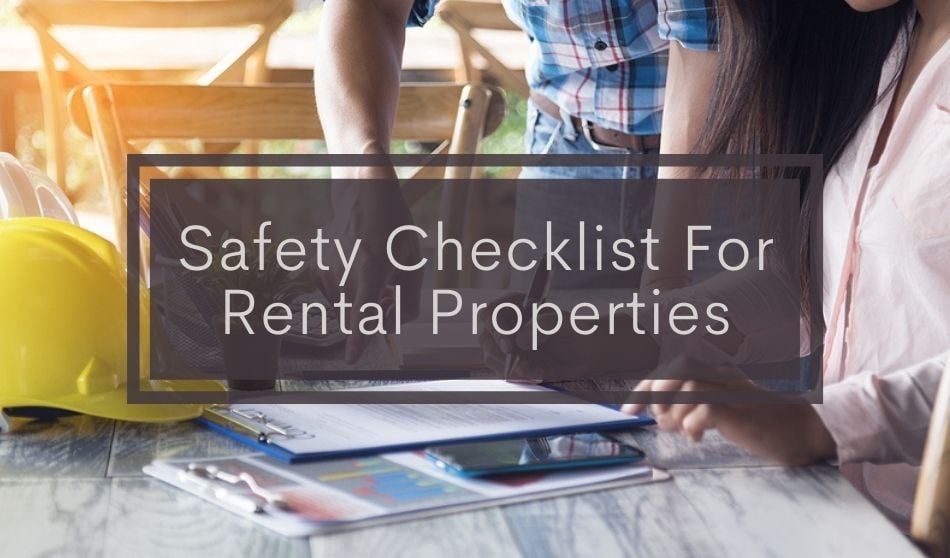 Rental property owners and managers are responsible for providing safe and healthy conditions for their tenants. Rental property safety includes keeping tenants safe from physical harm from insecure or damaged structures, reducing the threat of criminal intruders that could harm or threaten your tenants, and providing a property that does not negatively affect a tenant’s health.
Rental property owners and managers are responsible for providing safe and healthy conditions for their tenants. Rental property safety includes keeping tenants safe from physical harm from insecure or damaged structures, reducing the threat of criminal intruders that could harm or threaten your tenants, and providing a property that does not negatively affect a tenant’s health.
Landlords and property managers can provide safe conditions for their renters by performing a few basic safety and maintenance procedures before and after a lease term. Safety checks will help you address risk issues before they cause additional property damage or hurt a tenant.
Not only is it a good idea to provide a safe home to your tenants, but it is also the law. According to the legal team at Nolo, most state laws require a landlord to provide a safe and livable home by ensuring that:
- Structural elements of the building are secure and intact, including floors, stairs, walls, and roofs
- Common areas, like hallways and stairways, are in a safe and clean condition
- Electrical, plumbing, heating, ventilating, and air-conditioning systems and elevators are operating safely
- Hot water heaters and heating systems work appropriately at reasonable times
- Known environmental toxins, like lead paint dust, asbestos, and mold, are managed appropriately
- The threat of foreseeable criminal intrusions are reasonably reduced
- Infestations of rodents and other vermin are exterminated.
Regular inspections of your property will help keep your tenants safe and prevent further property damage by identifying small problems before they become expensive repairs.
Interior Safety Check
- Doors – Both interior and exterior doors need to open and close properly. If a door doesn’t close securely, your tenant could be at risk for an intrusion. If a door doesn’t open smoothly it could be a fire evacuation hazard.
- Lights – Turn every light switch on and off. Do they come on smoothly? A delayed response could indicate faulty wiring, which can spark a fire.
- Outlets – Check all wall outlets to make sure they work appropriately and that the cover panels are secure. Black, scorched, or dangling wires are also hints of bad wiring.
- Ceilings – Look for any water stains, cracks or sags in the ceiling that could be an indication of a water leak or damaged roof that needs to be addressed immediately before it causes additional property damage or collapses on a tenant.
- Walls – Check all the base of walls and look for any cracks or holes that could let vermin or other pests find a home in the walls. Walls are susceptible to water damaged and should be examined for cracks and water stains.
- Floors – Sloping floors can indicate structural damage or foundation problems and should be repaired or replaced immediately. Stains and soft spots in the flooring can also reveal rot or water damage.
- Fireplace – A good old fashion chimney sweep will remove any debris that has built up during the fireplace’s warm weather hiatus. A clogged chimney runs the risk of igniting a chimney fire or poses a potential health risk for your tenants if the ventilation system is blocked.
Appliance Safety Check
- Smoke and CO Alarms – Even if you require tenants to maintain the smoke detectors and carbon monoxide alarm systems, you should make it a habit to double-check they are working properly every time you inspected the property or perform routine maintenance. A passive tenant will easily forget to change the batteries, or worse, some tenants will remove them altogether.
- HVAC System – Have your heating system inspected, serviced, and cleaned at least once a year. Proper maintenance can extend the life of your furnace, postponing an expensive replacement. Remind your tenants to change air filters regularly, and provide them with extra filters to make sure it gets done – this is an inexpensive maintenance task that can prevent major HVAC problems.
- Washer/Dryer – Lint and debris can build up over time in dryer vents, which can damage the appliance and even cause fires. While the dryer is running, check that the exhaust is coming out. If there isn’t much exhaust, check for blockages and clear them as well as you can. You may need a professional. Also may also need to vacuum the lint from the hose at the dryer.
- Stove/Oven – Make sure each heating element works properly if electric and that gas lines are clear and burners ignite appropriately for gas stoves.
- Refrigerator – Make sure the refrigerator maintains an appropriate and accurate temperature to keep food safely stored. Check any other supplied kitchen appliances to make sure they are functioning (dishwasher, garbage disposal, etc.)
- Water Heater – Check the temperature to make sure it is set below 120° F to prevent scalding. Test safety relief valve once a year to ensure proper operation and flush the system to remove sediment buildup which can cause a system failure.
- Plumbing – Check water supply and pressure on all sinks and showers: Does water flow properly? Flush the toilet to make sure it drains and refills properly without leaking any water.
Exterior Safety Check
- Walkways and Stairwells – Make sure all railings are secure and anti-slip or caution guards are in place. It is a good idea to routinely do this before winter seasons bring wet and icy weather. Walkways and common areas should also be well-lit and free of obstacles or debris.
- Lights – Ensure you provide good exterior lighting at every front door and around the property to improve visibility and deter criminal activity.
- Landscape – Trim bushes and exterior plants to reduce possible hiding spots for criminals.
- Windows- Make sure all the windows close securely and have working locks. Consider installing window pins to keep windows from opening too wide.
- Roof Inspection: Check for missing or lose shingles. A slightly damaged roof can lead to water exposure which causes deterioration of insulation, wood, and drywall, making electrical, plumbing, and HVAC systems vulnerable. Due to the importance of your roof, have a licensed, certified roofing professional check the condition of your roof.
Schedule regular safety inspections at least once a year, and again in between lease terms to provide safe conditions for your tenants. Give your tenants an easy way to submit maintenance requests to you so you can address health and safety concerns appropriately. Take maintenance requests seriously and respond to them quickly to prevent costly repairs – fixing a leaky sink is much more affordable than replacing the floor due to water damage. Some states even allow tenants to withhold rent or sue a landlord if a property repair that affects a tenant’s health or safety is not handled in a timely manner.
Make sure to keep excellent records of your safety inspections, including notes with dates and pictures. Inspection reports and paperwork help you keep track of the condition of your property, and can also serve as legal documents if anything happens to your rental home. Keep inspection reports and maintenance files stored electronically in your property management software account, which should provide unlimited cloud-based storage options linked directly to a property or a tenant for easy access and reference.
This article was originally published in August 2017 and has since been updated.






Great article, Kaycee!
Indeed, tenant safety and comfort should be on the top list of every property owner and manager. It’s not just about providing a roofed structure to your clients and taking their money in exchange, owners and managers have the moral obligation to make sure that the property is money and that comfort and well-being is also provided.
Aside from your safety checklist, I also offer some really good real estate checklists from this article: https://www.process.st/property-management-checklists/. It’s got tenant screening, manager screening and onboarding, and some really useful checklist that I know can make real estate business more efficient.
Thanks for the resource Liz!
What happened when your rent contract have the no pet policy but the owner verbally accepted? Can he claim any penalty for that?
You would need to prove that there was a verbal agreement. Unfortunetly, it will be a your word against his situation. Is there anything you can use to prove that this conversation took place?
Are owner/managers required to provide a fire extinguisher?
There are two battery operated smoke alarms in unit. Neither work… are they required to have fresh batteries in them?
This is a Honolulu rental.
Thank you
Depends on your state and county laws. While most states require a rental owner/manager to provide working smoke detectors, the actual batteries can be the renters responsibility. It should say in your lease who is responsible for batteries. In terms of a fire extinguishers, I am unaware of a law that requires an owner/manager to provide them in every unit. Some state or county laws require that fire extinguishers be provided in the hallways of multifamily properties, but not in the individual units.
the property i rent (manufacturing wharehosue) HAS a hazardous hydraulic oil spill in the ground. these environmental guys came to inspect the property bc hes renting this place out to a new tenant in a couple months. the landlord told us not to say anything to these people when they were here or he would kick us out!!! he is ALREADYis kicking us out!!! we just don’t want t get kicked out any sooner he changed his” 3 months to move” to 30 days today!!!
we are definitely going to report it- but is there anything we can do to protect ourselves like can i report it anonymously ? this spill has been here for 10 years
i just looked it up online and its considered an EMERGENCY threat to the environment so its the law i HAVE to report it- i was just wondering if you had anything you can add to this to maybe in how to protect ourselves from him locking us out!
sorry my typing is terrible im writing with a broken hand amd it ssp frustatin eeven trying to post this .
please give me your thoughts
Your landlord must follow your state laws about providing proper notice and sticking to the timeline when informing a renter that the tenancy is over and it’s time to move out. It is illegal to lock out a tenant. Keep good notes about your interactions with your landlord and contact your local housing authority for advice on the situation, as they will be able to point you in the right direction.
I have a question regarding apartment complex billing statements in Raleigh NC. We’ve lived her for 3 years, always pay our rent on time based on a billing statement we receive from Conservice the Utility Experts. The statement includes our rent owed, water/sewer, trash and pest control fees.
Our apartment complex was bought by a new management company in Oct 2019. The have sent us a notice left on our front door demanding for 1 dollar owed in Dec which turned out to be an error. As we paid based on their billing provider exactly.
Now we paid our bill for Jan 2020 on time based on the Conservice bill and received a notice on our front door Jan 21, that we are short 24 dollars. Now our new lease kicked in Jan 8 and the new lease is 30 dollars more a month. But the change didn’t appear on our bill. The person who took the rent check is the same person who sent us the letter.
We were told by the asst manager there would be an adjustment but never received anything from them accept this letter. So twice in th ed last 2 months we have received these notices. Never once was there any issue with the last ownership.
I’m worried that they are going to mess up my credit rating due to their errors. I’m not late for any Bill’s I pay and it is very disconcerting how they are handling this and how demanding they are in their letters.
Hi Kenn, transitioning to a new management company can be challenging. If your statement is itemized you would have noticed that they forgot to charge you the rent increase amount. You may wish to talk to your local housing authority for confirmation, but I believe regardless of a statement error, the lease agreement is the abiding documentation on the required rent amount and they were likely in their right to send a letter requesting the amount owed.
Although it’s becoming more popular, late rent payments aren’t typically reported to a credit bureau so I would ask the new company if they have a policy of reporting. If so, to which bureau(s) and how often. I am sorry you found the tone of their letter disconcerting. Not knowing the circumstances of the management change, the new company may be facing challenges of their own inherited by the former company. I do hope these transition issues work themselves out for you quickly for you.
If a renter becomes handicapped and is confined to a wheelchair, is the landlord required to modify doors to accommodate a wheelchair? If the landlord refuses can the tenant break the lease agreement?
Hi Wayne, a landlord is required to consider the request but not necessarily approve and pay for the modification. It is not a simple cut and dry request/denial scenario but should be an interactive open discussion between the renter and landlord to find an agreeable solution (which might include being released from the lease agreement to seek other accommodations).
I highly recommend the renter and landlord both review the HUD guidelines for Reasonable Accommodations and Modifications. Hopefully, they can come to an agreement without a need for the renter to file an FHEO complaint.
Hi Heather, When I first looked at the apt I am in now almost 6 yrs. ago I loved it. All the tenants were over 50 which was great. My landlord was great and she only aloud 1 person to each unit, which was great also. Well my landlord decided to sell the place and none of knew it 😢. Now we are in our 3rd owner which are terrible because they are allowing couples and couples with one chil in a one bedroom. Our rent went up 75.00 and some 150.00. The new tenants moved in with upgrades and the ones that were here didn’t receive any, but our rent went up. Also shouldn’t there be rugs on the new ppl floors especially with kids. Afraid to complain to the new landlord because of invicton and more rent going up. Too old and worried!!!!
Hi,
Good evening, just wondering if my landlord is allowed to park two trailers on the property we rent from him ….(he never even asked us) we have a young child who plays in the back garden, is this a safety hazard? If anything happens is he liable for a hospital bill ? Should we ask him for rent money for keeping his trailers in the yard. They are awful ! He’s parked a big large trailer that looks like a caravan !
My landlord did an inspection and told me I have to move my bed from in front of the window, due to safety in case of fire. I told him if there were a fire , I’d probably just break the window to escape anyway and it would be easy to jump out from the bed. He told me if I didn’t move it they would have someone move it for me. Is this legal in Ohio.
What a great question! It sounds like the landlord is looking out for your safety and potentially working with his insurance carrier and state and local regulations for best safety practices. But to be certain, I would suggest you review your lease agreement, contact your local housing authority, and possibly the fire department for best answers.
I have a profound hearing loss. When I don’t wear my hearing-aid at night, I am totally deaf. What kind of safety accommodations are landlords required for hearing impaired?
Thank you for that great question, Elsa. The Federal Fair Housing Act provides those with a disability the right to request reasonable accommodations and reasonable modifications and the landlord is required to consider each request. This article might prove helpful in making those requests: Reasonable Accommodations and Modifications
I also found that the National Association of the Deaf offers this advice: Housing Discrimination
In addition to the above, you might want to reach out to your local housing authority as there may be additional local/state requirements on the landlord in your favor.
so…you want to hold your landlord responsible for YOU choosing to now wear your hearing aids??
Hi I am renting a property in Brisbane I don’t have a smoke alarm and I got broken power points in the kitchen And the owners of the property never come round and do any maintenance to the other four units regards Clifford
I’m sorry to hear that Clifford. Those are certainly health and safety issues that need to be addressed. First, I’d recommend all requests be submitted to your landlord in writing. Be sure to keep a copy for your records. Also, reach out to your local housing authority and ask them for recommended next steps if the landlord ignores those requests. I hope they honor those repair requests quickly for you.
As a renter of an apt what do you do about a stove that gives electric shock? We have had multiple complaints about this appliance. The oven doesn’t work right, the burners stop working, maintenance comes & “fixes it”.
Their answers are “it works”, “it’s your fault”, “if you get hurt, we’re screwed” also “we can’t replace it”.
By the name you offered, it appears you are a renter in Florida. I found this Florida consumer affairs website that might get you in the right direction. I would recommend reaching out to your local housing authority to discuss your rights and the landlord’s responsibilities for appliance repair in your state (county).
Getting shocked is a health and safety concern and the housing authority or the consumer affairs department should be able to tell you if you are within your rights to call an electrician and/or if the local fire marshall or city/county code enforcement need to be called to do a fire prevention check.
Lastly, remember to always put your repair request in writing and save a copy so you have a history of all interactions.
Is there any guidelines that determines the size of an oven exhaust hood? Recently the apartment complex replaced the washer/dryer, refrigerator, dishwasher, electric range & hood. The old hood was angled & extended 6” from the cabinets, the new ones ARE NOT ANGELED and extend 8” from the cabinets. This extra 2” is a menace until getting used to it. The question is, given the difference between the two units, would the 8” actually be allowed?